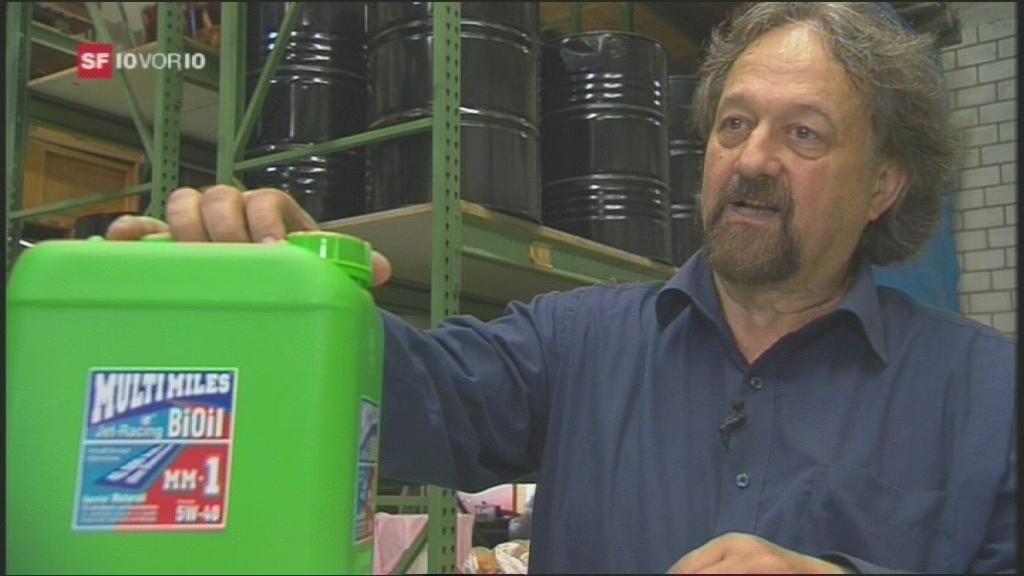Oil and grain keep flowing through Switzerland

While the banking, watch-making and manufacturing industries gather most headlines, the Swiss commodities trading sector has been making headway almost undetected.
Last year, trading in commodities such as oil, grain and electricity contributed around two per cent of the total Swiss economic output – about the same as tourism. But the secretive sector is undergoing changes.
Switzerland has long been a global centre in the commodities trading world thanks to its central European location, strong banking tradition and stable political and economic system.
The flow of cotton and coffee has passed through Swiss borders for hundreds of years while the oil booms in the Middle East and Russia increased Switzerland’s importance. But recent changes to the commodities industry, using ever more complex financial instruments to trade and speculate, has led to an explosion of activity in Zug, and most importantly, Geneva.
“There was a huge boost to the industry ten years ago,” Emmanuel Fragnière, vice-director the bachelor trading programme at the HEG college in Fribourg, told swissinfo.ch. “About that time the business started to mimic the financial industry as the commodities markets became more volatile.”
“This created new demand for support infrastructure, such as IT, legal advice and operational consultancy services.”
Big names, small names
There is even anecdotal evidence that commodities traders are starting to flee London’s recent tax hikes. However, just like the hedge fund industry, the exodus appears to be more of a steady trickle as opposed to a flood.
Economists are starting to take the commodities trading industry more seriously as it increased its contribution to the Swiss gross domestic product from less than 0.5 per cent in 2003 to two per cent last year. The KOF Swiss Economic Institute now gives more weight to the industry when it makes economic forecasts for the country.
With 6,000 jobs in the Geneva area alone – and more at the Zug giants such as Glencore – Switzerland is viewed as a major global commodities player, alongside such names as London and Singapore.
Several multinational heavyweight companies now have a major presence in Switzerland. Glencore, Vitol, Trafigura, Guvnor and Mercuria are just some of the well established big names, generating billions of dollars in profits between them last year.
The global giants are supplemented by a profusion of smaller boutiques in the Geneva region that specialise in niche services and trading. However, the financial crisis has taken its toll in the smaller enterprise sector as profits tumbled alongside commodity prices last year and credit in the volatile industry became harder to find.
Impact of financial crisis
The whole landscape of the sector has transformed in the last year, according to Geneva-based trader Samir Zreikat. The firms that took the brunt of the storm were those who were big enough to be badly exposed, but too small to deal with the financial consequences alone.
“We are witnessing a change in the industry as the big players become bigger and the better performing smaller ones become even more streamlined,” he told swissinfo.ch. “We are seeing a shift to extremes as the mid-sized players start to disappear.”
Another threat to the continued success of the Swiss-based commodities traders is the pressure on banking secrecy. Confidentiality play a big part in striking deals with governments and the ability to play cards close to the chest when speculating on price fluctuations.
Switzerland has been forced to concede ground in the last year during an international crusade against the secrecy of its financial system. Although commodities trading is not linked to tax evasion, banking secrecy has a major role to play as the industry becomes more financial in nature, according to Fragnière.
“Obscurity is a big part of the business,” he told swissinfo.ch. “Transparency is not always a good thing when making a deal with a government because in many cases it is so closely linked to a delicate political situation.”
Secretive world
Such obscurity sometimes tarnishes the reputation of the industry, particularly when it deals with undemocratic regimes in war-torn parts of the world. Mining and oil production is often linked with exploitation, while companies can easily find themselves in trouble for dealing with the wrong regimes.
Much has been made of recent attempts by Glencore to buy publicly traded mining giant Xstrata. Rumours have also abounded that it will also go public following a $2.2 billion (SFr2.35 billion) bond offer in December.
But observers believe the commodities business is set for further growth, buoyed by massive demand for oil and minerals from countries such as China, the new craze in bio-fuels and recent innovations, such as the trading of carbon credits.
“There may be fewer players in the future that look more and more like banks,” said Zreikat. “But the industry is still essentially about moving goods. Traders will still play an important role in terms of what is needed by countries and populations around the world.”
Matthew Allen, swissinfo.ch
Swiss towns such as Winterthur, Lucerne and Lausanne have a long tradition of trading in commodities such as cotton or coffee, cashing in on Switzerland’s central European location.
After the two world wars, commodities traders started looking more closely at neutral Switzerland whose economy and political structure has survived the conflicts unscathed.
The first grain trading houses appeared in Geneva in the 1920s while Switzerland offered a neutral venue for US companies to engage in trade with Eastern bloc countries during the Cold war.
Geneva’s popularity as a destination for Middle Eastern travelers gave the city an edge as the oil industry started booming in the region. Oil traders were joined by cotton merchants escaping from Egypt in the 1960s.
Russian oil concerns followed in the 1990s, establishing a commodities industry in Zug.
The exact impact of Switzerland’s commodities trading industry is hard to judge thanks to its closed nature. But some observers estimate that Switzerland accounts for 70 per cent of Russia’s oil and the country has a similar share of the world’s market in other commodities.

In compliance with the JTI standards
More: SWI swissinfo.ch certified by the Journalism Trust Initiative




You can find an overview of ongoing debates with our journalists here. Please join us!
If you want to start a conversation about a topic raised in this article or want to report factual errors, email us at english@swissinfo.ch.